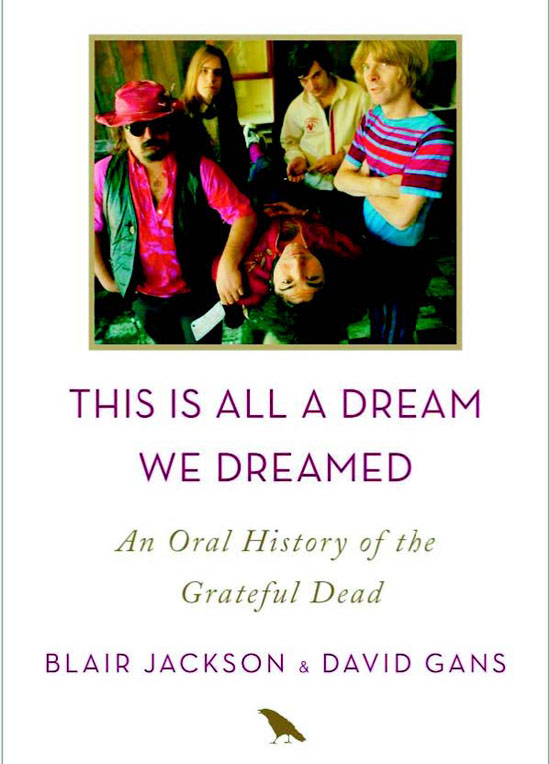
| ||||||
So it's a distinct pleasure to discover fresh territory to explore and the perfect, comprehensive, near-3D-like coverage provided by "This is All a Dream We Dreamed: An Oral history of the Grateful Dead" (Flatiron Books), by Bay Area archivists and authors Blair Jackson and David Gans.
The authors will discuss and read from their new book at 7 p.m. Thursday, Jan. 7 at the Lafayette Library and Learning Center.
Not unlike stumbling upon a great, new indie band that stirs up insider memories related to your favorite 1960s or 70s rock 'n' roll band, the 512-page book delivers an oral history from within the Dead enclave. Capturing the band's essential aura through the words of band members and their collaborators is riveting, even for readers who don't claim to be Deadheads. The myths and magnetism that drew a dedicated fan base is illustrated through interviews with over 100 people, including unofficial leader Jerry Garcia, drummer Mickey Hart, concert promoter Bill Graham, Carolyn "Mountain Girl" Garcia, band member Bob Weir and others. Braided into the disparate, personal accounts with clarity and an admirable lack of hyperbole, given their backgrounds as Dead aficionados, Jackson and Gans insert fact-laden bridges to bolster an engrossing narrative.
Jackson ("Grateful Dead Gear; Garcia: An American Life," and others) covered the band for over 25 years and co-wrote with his wife, Regan Jackson, "The Golden Road," a Dead fanzine published from 1984 to 1993. Gans, a musician and author ("Conversations with the Dead" and others), produces and hosts the nationally syndicated radio show, "The Grateful Dead Hour."
For readers of the new book, Dead fan or not, the band's influence on sound technology alone is fascinating. The introduction of 16-track demo tapes, noise-canceling headphones, a massive, 604-speaker "Wall of Sound" developed in 1974 that transformed stadium concerts, and more-reveal the impact that a group of motley (and mostly) guys in T-shirts have had on an art form.
For people who prefer drama, the internal tensions and traumas of a culture that included psychedelic drugs, radical improvisation, on-purpose "pirating" of concerts and big egos mixed with artists who just wanted to pick up guitars or drumsticks and do their thing are presented in a stew of a story that never gets muddled. From a literary standpoint, Jackson and Gans have as fine an ear as members of a band. They are skilled at selecting the most potent voice to tell a story. Arranging the precise transitional phrase of one person's perspective to juxtapose the next voice, the underlying thread is never lost or ragged. The effect is similar to surround sound, causing history and "characters" to leap off the page in organic, believable fashion.
"As with every book I've written, it was too long at the start," says Jackson. "It was an ambitious canvas. At some point, it occurred to us that our editor wouldn't print an over-1,000-page book."
Winnowing the interviews was a smooth, yearlong process involving Google Docs. The two authors, who live only four doors apart near Lake Merritt in Oakland, sometimes worked simultaneously on the same document. "I'd be plugging things in and see, oh, there's David," Jackson says. The final determinations were made sitting side-by-side and took approximately one month to complete. Jackson says the greatest challenge was "not thinking about everything we didn't cover or had to leave out." Candid inclusion of the darker, most tragic elements - band members' professional disputes, Garcia's addiction that ultimately ended his life Aug. 9, 1995, financial mismanagement and more - was guided by a philosophical approach he equates to "not glossing over history."
The most distinctive pruning adhered to one idea: keep the music central. For that reason, the chronicle picks up in 1965 and concludes in 1995. "We decided from the get-go, we weren't going into people's personal lives," says Jackson. "This is not the sex, drugs and rock 'n' roll history at all. This has nuance and shades of personal stories, but it's not designed to tell a linear story in a detailed way." The post-Garcia history, he says, is equally sordid and strange. "It's a can of worms and doesn't have to do with the Grateful Dead except it's a part of their legacy. There's probably a book in that, but I'm not going to be the one to write it."
This year's "Fare Thee Well" anniversary tribute event bloomed from three performances planned for Chicago's Soldier Field into an additional two warm-up shows at Levi's Stadium in Santa Clara and a pay-per-view simulcast that dwarfed any music event to date. Estimated revenue was $55 million, even before CDs and DVDs were released. All of which is to say that a 1995-to-now book, if handled with equal skill, would likely be a strong seller.
Asked what people can expect at the library event, Jackson answered as expected. "David will play a few songs. We'll talk about the book. After that, we'll wing it, in the Grateful Dead tradition."
Reach the reporter at:
